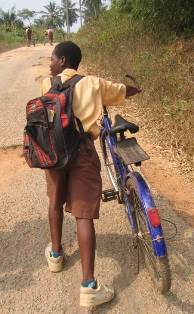Previous Project
Improving Policy on Children’s Mobility and Access Through Development of a Participatory Child-Centred Field Methodology/Toolkit

Project Outline
Children and youths under the age of 18 have received remarkably little attention in transport and mobility studies and transport policy in low income countries. There has been limited work on road safety. This is an extremely important omission, given that over half the population of many such countries consists of children and young people in the age group 0-18. Improving mobility and access to facilities for this group is crucial if the Millennium Goals of Universal Primary Education, Promotion of Gender Equity and empowerment of Women, and Reduction of Child Mortality are to be achieved.
In this project funded by the UK Department for International Development our aim is to develop a specific child-centred methodology. This methodology can be used by transport professionals, policy makers and children themselves to identify children’s transport and access needs and constraints in diverse settings. The application of innovative child-centred approaches developed by our NGO collaborator, the Concerned for Working Children (CWC) to the transport and mobility context, are central to this work.
Our Research Objectives
- to develop a child-centred participatory methodology for understanding transport/mobility/access constraints faced by children and youths and ways of reducing or eliminating these constraints;
- to test and fine-tune this methodology in three different country contexts: Ghana, India and South Africa.
Girl and boy children often face significant but diverse problems in accessing health, educational and other facilities in low income countries. There is a lack of direct information on how these constraints impact on children’s current and future livelihood opportunities, and a lack of guidelines on how to tackle them. Preliminary work in Ghana by Gina Porter and Kathrin Blaufuss suggested some broad hypotheses about children’s mobility and access to transport. The wider impact of children’s mobility constraints on livelihood opportunities need testing and, if correct, addressing:
- Lack of reliable low cost transport may severely affect access to regular education, with knock-on impacts on subsequent livelihood opportunities. In Ghana, South Africa and India, our study countries, Universal Primary Education is a long way from achievement, especially for girls.
- Lack of reliable low cost transport may impact severely on children’s access to health services. This includes vaccination and other preventive health services, and to adequate safe water supplies.
- Children’s widespread, but often hidden, role as transporters (pedestrian headloaders, and sometimes IMT operators) may further substantially constrain their access to education, health and associated livelihood options. This is because it reduces the time available to attend school or health centres etc. This is likely to apply particularly to girls.
- Some Intermediate Means of Transport (IMTs), notably bicycles, may have an important potential role in improving access to school and other services. However cultural and other factors are likely to impede their adoption, particularly among girls. Policies to promote wider availability of cycles (for learning to ride) and cycle repair courses for girls and boys in school might impact positively on school attendance.
- Mobility constraints may impede children’s subsequent livelihood opportunities through impacts on both education and health and thus reduce overall long-term potential for poverty eradication. The constraints are likely to be even greater for girls than for boys.
- Mobility constraints on children are likely to be higher in rural than urban and peri-urban areas. However even in an urban context there may be substantial constraints on access imposed by transport factors, particularly for girls.
We are unlikely to be able to fully understand and address these issues without the prior development of appropriate child-centred participatory methodologies. Methodologies should be specifically tailored to examining mobility and access issues. This project aims to provide a basic child-centred participatory research methodology/tool kit through which we can start to tackle these issues.
Although children’s participation in development agendas has increased, many researchers observe that there is still much tokenism where children’s voices are concerned. In this study our aim is to try to engage children themselves in developing a research methodology/toolkit, following the lead of our Indian NGO collaborator organisation, which already has substantial experience in innovative child-centred participatory methodologies.
Our project is taking place in collaboration with National Forum groups of the International Forum for Rural Transport and Development (IFRTD). The IFRTD secretariat and the National Forum Groups will play a key dissemination role.

Timetable
June to October 2004: literature searches and workshop preparation
October 2004: inception workshop
November 2004 – February 2005: pilot trials
March 2005: review workshop
May 2005: project completion
Researcher Contact Addresses
Dr Gina Porter and Dr Kate Hampshire (Department of Anthropology, University of Durham),
Ms Priyanthi Fernando (IFRTD London)
Ms Nandana Reddy and Mr P. Lolichen (CWC Bangalore)
Professor Albert Abane (University of Cape Coast, Ghana)
Mr Mac Mashiri (CSIR: Transportek, Pretoria and National Forum Group for rural transport, South Africa)
